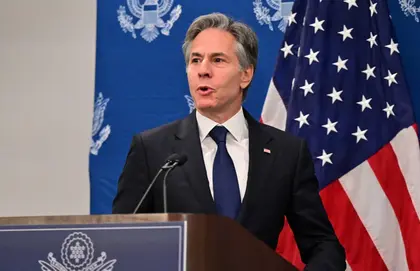US Secretary of State Antony Blinken departed Monday, Nov. 27, to Europe to rally support for Ukraine, on a trip where he could cross paths with his Russian counterpart but is unlikely to meet him.
Blinken, who has spent the last month consumed with the Israel-Hamas war and a US-China summit, was bound for talks with NATO foreign ministers in Brussels on another top US priority.
JOIN US ON TELEGRAM
Follow our coverage of the war on the @Kyivpost_official.
Blinken is then expected to head Wednesday to a meeting in North Macedonia of the Organization for Security and Co-operation in Europe (OSCE), said James O'Brien, the top US diplomat for Europe.
"We anticipate that he'll engage in a good discussion with our OSCE colleagues about support for Ukraine," O'Brien told reporters.
Russian Foreign Minister Sergei Lavrov said Monday that North Macedonia, which has joined Western sanctions over Moscow's invasion of Ukraine, has agreed to let him attend the annual meeting of the pan-European security body in which Russia is a member.
Russian state media said that EU member Bulgaria has informed Moscow it would allow Lavrov's plane to cross its airspace.
But Deputy Foreign Minister Sergei Ryabkov said there would not be a meeting with Blinken.
"No, (they) haven't asked, (they) won't ask and there won't be a meeting” he told Russian state news agencies."
Last year, OSCE host Poland refused to let Lavrov attend, sparking an angry response from Russia.
US officials have cut most top-level contact with Russia since the February 2022 full-scale invasion of Ukraine, although Blinken briefly met Lavrov in March on the sidelines of a G20 meeting in India.

US Freeze on Aid Puts Ukrainian Lives at Risk – Human Rights Watch
O'Brien declined comment on whether Blinken would see Lavrov and said that the top US diplomat's schedule was subject to change.
In Brussels, Blinken will speak about US support for Ukraine over the coming months, with Kyiv pursuing a counter-offensive at a time that much of global attention has shifted to the Middle East.
President Joe Biden's administration is trying to persuade opponents in the Republican Party to approve another $61 billion in aid to Ukraine, which he has tied to support for Israel and Taiwan.
O'Brien said the administration was confident about support in Congress for Ukraine and cast the aid as a "coalition effort," with Kyiv paying for 60 percent of its military costs and the United States and allies paying for the rest.
"I think it's important for our partners to hear that we'll continue to do our part, even while our Congress is debating the next steps of what we'll provide," O'Brien said.
You can also highlight the text and press Ctrl + Enter










